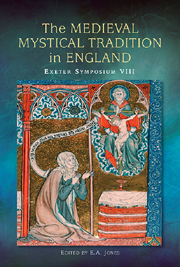 The Medieval Mystical Tradition in England
The Medieval Mystical Tradition in England Book contents
- Frontmatter
- Contents
- Lists of Diagrams and Figures
- List of Contributors
- Abbreviations
- Introduction
- The Colours of Contemplation: Less Light on Julian of Norwich
- Behold Not the Cloud of Experience
- Walter Hilton on the Gift of Interpretation of Scripture
- Numeracy and Number in The Book of Margery Kempe
- Religious Mystical Mothers: Margery Kempe and Caterina Benincasa
- Authority and Exemplarity in Henry Suso and Richard Rolle
- Mortifying the Mind: Asceticism, Mysticism and Oxford, Bodleian Library, MS Douce 114
- The Meditaciones of the Monk of Farne
- Envisioning Reform: A Revelation of Purgatory and Anchoritic Compassioun in the Later Middle Ages
- Walton's Heavenly Boece and the Devout Translation of Transcendence: O Qui Perpetua Pietised
- Reformist Devotional Reading: The Pore Caitif in British Library, MS Harley 2322
- Richard Whytford, The Golden Epistle, and the Mixed Life Audience
- Afterword: Future Prospects
- Index
The Meditaciones of the Monk of Farne
Published online by Cambridge University Press: 05 July 2013
- Frontmatter
- Contents
- Lists of Diagrams and Figures
- List of Contributors
- Abbreviations
- Introduction
- The Colours of Contemplation: Less Light on Julian of Norwich
- Behold Not the Cloud of Experience
- Walter Hilton on the Gift of Interpretation of Scripture
- Numeracy and Number in The Book of Margery Kempe
- Religious Mystical Mothers: Margery Kempe and Caterina Benincasa
- Authority and Exemplarity in Henry Suso and Richard Rolle
- Mortifying the Mind: Asceticism, Mysticism and Oxford, Bodleian Library, MS Douce 114
- The Meditaciones of the Monk of Farne
- Envisioning Reform: A Revelation of Purgatory and Anchoritic Compassioun in the Later Middle Ages
- Walton's Heavenly Boece and the Devout Translation of Transcendence: O Qui Perpetua Pietised
- Reformist Devotional Reading: The Pore Caitif in British Library, MS Harley 2322
- Richard Whytford, The Golden Epistle, and the Mixed Life Audience
- Afterword: Future Prospects
- Index
Summary
The Meditaciones of the Monk of Farne remain curiously untouched. W. A. Pantin wrote an excellent article on them in 1944. David Hugh Farmer published an edition of the Latin text in the late 1950s, followed some forty years later by a Benedictine translation. But apart from this they seem to have shot beneath everyone's radar, only ever mentioned in passing as a relatively late example of an insular tradition of Latin meditation from which the vernacular mystics eventually triumphantly emerge. So, their Latinity has done them a marked disservice. However, there remains much more to say about these texts, not least with respect to their sophisticated content, passages of mysticism, and substantial size, and I would argue that they deserve to be written back into the master narrative of late-medieval devotional and mystical literature in a fairly prominent way.
This essay will offer a brief description of the texts themselves, followed by remarks on their position within a north-eastern tradition of Cuthbertine spirituality, their affinities with Richard Rolle's writings, and their use by the Durham Benedictines during the fifteenth century. The ‘Monk’ is a monk solitary from Durham Benedictine priory, living in a hermitage on the island of Inner Farne, off the north-eastern coast of England. Probably or possibly he is John Whiterig, who is known to have occupied the hermitage between 1363 and 1371.
- Type
- Chapter
- Information
- The Medieval Mystical Tradition in EnglandPapers Read at Charney Manor, July 2011 [Exeter Symposium 8], pp. 125 - 140Publisher: Boydell & BrewerPrint publication year: 2013


